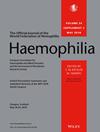Systematic Literature Review of Outcomes Associated With Adherence to Haemophilia Drug Therapy
Abstract
Introduction
Prophylactic therapy improves clinical and quality of life (QoL) outcomes in patients with haemophilia; however, this effect could be influenced by the degree of treatment adherence. Adherence to therapy may be difficult due to the administration mode and the frequency of self-infusions. There is a need to investigate the effect of treatment adherence on clinical, humanistic and economic outcomes in a real-world setting.
Aim
A systematic literature review (SLR) was performed to describe the impact of adherence to haemophilia drug therapies on clinical, humanistic and economic outcomes.
Methods
Embase, MEDLINE and the Cochrane Library were searched for English language articles published after 22 June 2013; the search was conducted on 22 June 2023. No geographic limits were applied. Twenty articles met the inclusion criteria.
Results
The studies investigated associations between treatment adherence and bleeding, joint health, inhibitor development, pain, QoL, daily activity/work productivity (WP), cognitive function and healthcare resource use. Fifteen studies reported that better adherence to drug therapy in patients with haemophilia is associated with better outcomes, including a reduction in bleeding risk, improved joint structure and function, less chronic pain, better health-related QoL (HRQoL), lower activity impairment (AI), less school/work absenteeism, higher WP and better cognitive function. Two studies reported mixed results, with adherence being associated with some outcomes but not others. Five studies reported no association.
Conclusion
This SLR found associations between greater adherence to haemophilia drug therapies and better results on clinical, humanistic and economic outcomes, indicating that patients with haemophilia would benefit from improvements in treatments that promote adherence.


 求助内容:
求助内容: 应助结果提醒方式:
应助结果提醒方式:


